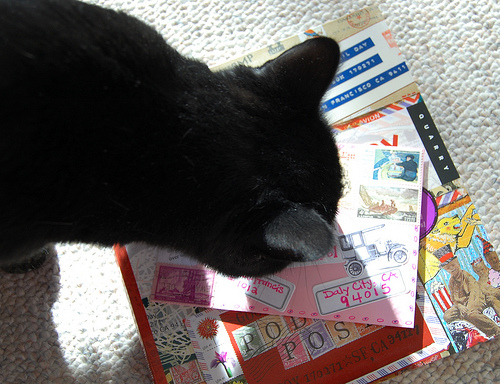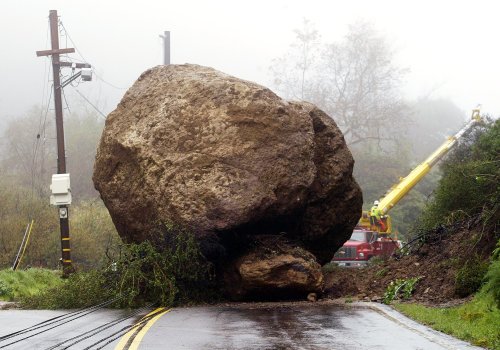5 Tips to Avoiding Total Disaster as a Novelist
Today’s guest post is by copywriter, editor, and educator Jessica Millis:
Anyone who has ever read (or written) a book knows about the old saying that everyone has a book in them. I can’t deny this. Everyone does have a book in them. Unfortunately, people often leave out the asterisk. Just because you have a book in you doesn’t mean it’s going to be good.
Most novels in the online and offline market today are garbage. They’re pumped full of high-powered marketing and geared towards people who will likely read them once on a long flight.
I’ve read so many garbage novels that I believe it’s time to start chopping off some hands. I’m also a firm believer in improvement, though. Anyone can be a writer, but not everyone has the ability to improve their skills and take it to the next level.
Here are my top tips for becoming a best seller over the bargain-basement railway to the land of fail.
1. Don’t Spend Forever Gathering Material
My favorite procrastination excuse is, “I’m just gathering material for my next book.”
No, you’re not. You’ll gather material for the rest of your life. It’s called being a living, breathing human being. The fact is you get better at writing by writing. You’re not writing when you’re researching, picking your nose, or banging your pencil off your two front teeth.
Burn those notebooks and just get started. You can fix any bad plotlines later. Furthermore, what’s stopping you from adding in new material as you go along?
2. Don’t Waste Time Testing Forms
Writing comes in a great deal of forms. I’ve seen poems that take the form of prose and multi-person narratives that make a story a whole lot more interesting. There’s also essay writing, complex plots revealed exclusively in letters, and written transcripts.
These are the enigmas of the writing trade. They do tend to leave their marks, but most people can’t handle them. They require a very specific type of writer to manage them. The novice will only tie himself in knots and come up with the writing equivalent of Alphabetti Spaghetti.
You can experiment in your own time when you’re not working on your novel.
3. Don’t Be about Breaking the Writing World
There are some people who will revolutionize writing. They’ll come up with an entirely new genre or form. New writers often fall victim to this. Before they’ve been hit with a rejection later, they’ll believe they’re the greatest thing to happen to writing since forever.
The problem is, these godly writers have yet to actually write and publish anything.
Most of the new genres that have appeared throughout history happened by accident. The authors didn’t create them. They were forced upon them by observers and critics. Writers simply write about what they know and love.
You’re writing for yourself, not to impress others. Once you start to travel down this road, the emphasis leaves writing quality and it becomes nothing more than a giant ego trip.
The next time you come up with something you believe will conquer and change the writing world, ask yourself this question: “Is there a reason nobody has ever done this before?”
4. Read it Aloud
Storytelling started as an oral profession. People would sit around a fire and they would tell people stories. They would engage their brains to come up with distinctive characters all with different voices.
Writing today is a fast process. There’s no delay in the words and no real thinking involved. You can pump out the equivalent of a full-length novel in a week, if you truly wanted to.
During this time you’ll leave words out, and your sentences will sound as if they come from someone who simply used Google Translate over and over again.
Find people who will be willing to listen to your story. Read it to them and you’ll be forced to listen to the words. You might uncover errors you never spotted by sight. What you’ll also see is whether your writing really works.
Have you missed important points? Are the characters consistent with the manners and behaviors you created for them? Have you really done the best you can?
These are all questions you will answer by reading your work aloud.
On a side note, you might even want to consider downloading a voice-recognition program. All you have to do is speak into a microphone and the words appear on the screen. It’s an increasingly popular method of writing.
5. Ignore Convention
Yes, I know, this is sort of contradictory to those points about trying hard to be different. There’s a difference, though.
On one hand, you are not trying to be different for the sake of being different. On the other hand, you are simply refusing to be restricted by conventions.
Stay away from phrases like “Just write about what you know,” because you’ll never grow. Experiment with new things and incorporate them into what you know. Writing is about exploring, and only through looking at something new will you get better.
 Jessica Millis, experienced writer, editor and copywriter. She works as an educator in James Madison University (writing classes) and at EssayMama.com as an essay writing specialist. Featured Photo Credit: Lori Joan via Compfight cc
Jessica Millis, experienced writer, editor and copywriter. She works as an educator in James Madison University (writing classes) and at EssayMama.com as an essay writing specialist. Featured Photo Credit: Lori Joan via Compfight cc












Another excellent article.
Thank you! Glad to hear it! )
Jessica,
This is awesome advice. I keep coming to Live Write Thrive and finding something ostensibly about fiction writing, that applies absolutely to nonfiction writing as well. I’m storing up ideas and a list of URLs to share with people I teach and coach.
Thanks for a great article.
I’m not sure writing for yourself is such a bad thing. I think too many write to impress others, fail, and then give up.
I think writing for yourself is the best thing. We should write what is in our hearts and tell the stories we yearn to tell. We can always carve out time to write for other reasons, such as to make an income, if our passion doesn’t lend to that.
Such an interesting article and really helpful to writers. Sometimes we all try to be a bit clever, when the best does really come from the words and emotions that fight to tumble onto the page, rather than artful constructs and phrases.
Thank you for this brilliant advice – I started as a ‘pantser’ but am trying to be more organised with my second novel. It’s hard, because I’m itching to start writing – and this is an excellent reminder that I need to enjoy what I’m doing and not make it a chore… inspiration is key, isn’t it? It should not be a slave to research, but the other way around. Thank you again!
x
Elaine
Great Article Jessica! I think travel is one of the ways authors can grow and expand and I agree wholeheartedly with the point about writing something experimental just to be different! I think as you develop as an author, your own style will emerge and if it ends up being different and unique, that’s what will happen organically!
Again wonderful article!
Patti
I agree with all this and god knows I am no writing god what I am is a closet writer until recently my husband convinced me to write the novel I am working on. I have no idea where to begin to even get my book edited or looked at any help would be appreciated because frankly i am paralyzed.
Hi Debbie, getting a professional critique on your work so far will really help you. I work with writers at just about any stage, from outline to finished novel. Having a writing coach will really give you the inspiration and direction you need!
I loved that you dismissed the “write what you know” advice. Nothing was worse as a young writer than being told I couldn’t write about certain topics because I hadn’t done something or been somewhere. I was often told “you need more life experience before you can write anything worthwhile”… A reader lives a thousand lives, as does a writer.
What the advice should be is: Write what you’re passionate about. This will sustain you when you’re still writing that novel three years later. Writing what you’re passionate about will satisfy you like nothing else.
‘Writing what you know’ is no recipe for success, and it’s something usually said by someone who’s never written a word of creative writing in their life.
Thanks again for fantastic post 🙂
i agree that it is important to ignore convention and write your own book. I’ve come to appreciate the advice I received from my English teacher as a kid – learn the rules, then break them at will. So many times, those of us that write in a particular genre feel we have to write the same book over and over again because that is how it has always been done. Write your book.
This is very helpful. Thank you. I do only write what I am passionate about, but have have noticed lately, alot of not writing the next book! Stuck at 60,000 words!
So writing comments, guest posts, articles, interviews for newspapers, facebook, Twitter, emails etc etc.
Back to writing the next book now!
Just when I hit writing rock bottom, some compassionate soul like yourself picks me up off of writer’s block skid row, brings me into the frustrated writer’s mission, gives me a bowl of encouragement soup, and convinces me to get back out there. For the past three years I’ve written picture book manuscripts, short stories, flash fiction, a YA novel, a middle grade novel, and a personal memoir. All I have to show for it so far is over 400 hard copy and email rejection letters. And yet I remember what the writer once said, “If you can quit, quit. If you can’t, you’re a writer.”
Very valid points but…now I’ve got to the point where the novel is edited cover designed and I feel as though I am teetering on the edge of my cliff.. cliff
Love what Jessica has to say and she says it well.
Also identify with Maria Matthew’s comment re “the cliff” as I have been there many times during the past year working on a first fiction. It is the most scary place to be and the loneliest. I finally beat it by taking a deep breath, reaching out and asking for help. Getting to know and trust someone without actually sitting across the table with a cup of coffee (online even) totally goes against my life experience but guess what. I sent the darn story off to a fellow author and she actually gave me some good advice for editing. Imagine that and on the first leap from the cliff!
Your story seems familiar to me, Linda 😉
Thank you for sharing.The phrase “writing is about exploring” and your tip about reading aloud hit home.
Excellent Article!
I can surely use it. Thanks for sharing.
Loved the article and yes I’m thinking right now! I have the outline, the plot and the first chapter written. No, I’m not just a talker, I have written three novels and am working on the fourth!
Thank you for the great advice, we all need a kick up the bum from time to time and yes, I AM going to get stuck in as soon as I have finished “tarting up”one of my short stories for a prestigious competition 🙂
Best wishes,
Diana
Writing today is a fast process. There’s no delay in the words and no real thinking involved. You can pump out the equivalent of a full-length novel in a week, if you truly wanted to.
During this time you’ll leave words out, and your sentences will sound as if they come from someone who simply used Google Translate over and over again.
Find people who will be willing to listen to your story. Read it to them and you’ll be forced to listen to the words. You might uncover errors you never spott